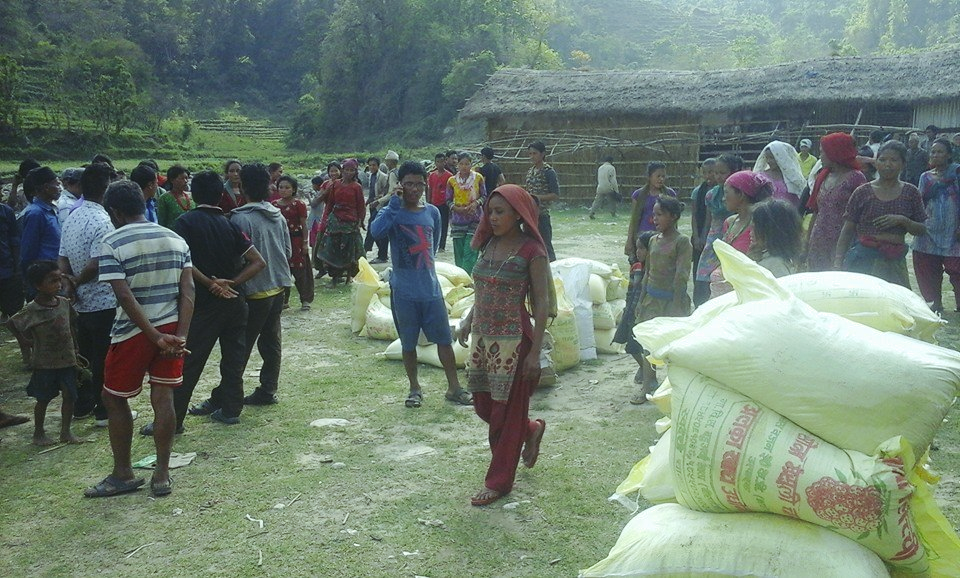Encounters with art and design by an anthropologist and curious non-expert in visual culture.
Tag Archives: fast writing
Writing Good Anthropology in a Time of Crisis: Lessons from the Nepal Earthquake
[Savage Minds is pleased to publish this essay by guest author Heather Hindman. Heather is Associate Professor of Asian Studies and Anthropology at the University of Texas at Austin. Her book Mediating the Global: Expatria’s Forms and Consequences in Kathmandu (Stanford University Press, 2013) explores the employment practices and daily lives of elite aid workers and diplomats over the last several decades of changes in the development industry, with a critical analysis of human resources management and cross-cultural communication. She is also co-editor of Inside the Everyday Lives of Development Workers (Kumarian Press, 2011). Her recent publications explore Nepal’s elite migration practices, the rise of voluntourism and the shifting interests of aid donors in Nepal. Currently, she is researching youth activism and labor, particularly among elites with overseas experience.]
How do scholars balance the need to write quickly and the need to write well? Pressures to “publish or perish” and the rise of “visibility indices” have led many of us to write in ways that will be recognized by our institutions, rather than in the other ways we also think and reflect. Some academics now are calling for a turn to slow scholarship, but this may be a luxury only the elite can afford. In a time of crisis, writing slowly does not work; instead, we need to write swiftly. Recently, I and many people who have conducted research in Nepal found ourselves under pressure to write quickly while still maintaining our academic integrity.

The April 25th earthquake in Nepal proved devastating for the country and spurred many in the anthropological world to action and comment. In the days after the quake, and propelled forward by the major May 12th aftershock, academics in the US, Europe and Asia found themselves overwhelmed by requests for interviews and op-eds, and many of us were eager to do something. I felt paralyzed and incompetent, sitting in Austin, Texas, trying to finish the semester, working closely with local student groups and NRN (Non-Resident Nepali) organizations and operating at a high level of distraction. Social media was afire with check-ins of who had survived, where the greatest damage had occurred and what resources were needed to keep people alive on a day-to-day basis. I found myself pulled into the social media world and addicted to email and messaging as I had never been before. Many of us sought to raise funds and awareness in our own communities, to establish contact with those we care about in Nepal, and to write brief articles as we felt able for media venues. After the initial flurry of media contacts, several of those who had written about the disaster were contacted by Anthropology News to write an article for their online forum. We hoped to get someone familiar with facts on the ground, yet many anthropologists who were in Nepal were dealing with everyday needs of seeking shelter, looking out for loved ones and trying to provide basic relief as they were able. AN Managing Editor Amy Goldenberg posted a brief piece that collected links to essays written by North American-based anthropologists for other venues, and there were promises from others to write more substantive articles when more research and reflection was possible. Then, Anthropology News—an official publication of the American Anthropological Association—found a respondent in anthropologist David Beine, Professor of World Missions and Evangelism at Moody Bible Institute. Continue reading
Fast Writing: Ethnography in the Digital Age
[Savage Minds is pleased to run this essay by guest author Yarimar Bonilla as part of our Writer’s Workshop Series. Yarimar is Assistant Professor of Anthropology and Caribbean Studies at Rutgers University. She is the author of Non-Sovereign Futures: French Caribbean Politics in the Wake of Disenchantment (University of Chicago Press, forthcoming Fall 2015) and has written broadly about social movements, historical imaginaries, and questions of sovereignty in the Caribbean. She is currently a fellow in the History Design Studio at Harvard University where she is working on a digital project entitled “Visualizing Sovereignty.”]
In a recent contribution to this writers’ series, Michael Lambek offered some reflections on the virtues of “slow reading.” In an era of rapid-fire online communication, when images increasingly substitute for text, Lambek argues we would be well served to revel in the quiet interiority and reflective subjectivity made possible by long-form reading.
In this post I would like to think more carefully about this claim and to consider whether we might want to make a similar argument regarding the shifting pace of academic writing. If, as Lambek and others suggest, the temporality of reading has been altered by the digital age, can the same be said for research and writing? How have new digital tools, platforms, and shifts in technological access transformed the temporality of ethnographic writing, and is this something we necessarily wish to slow down? Continue reading